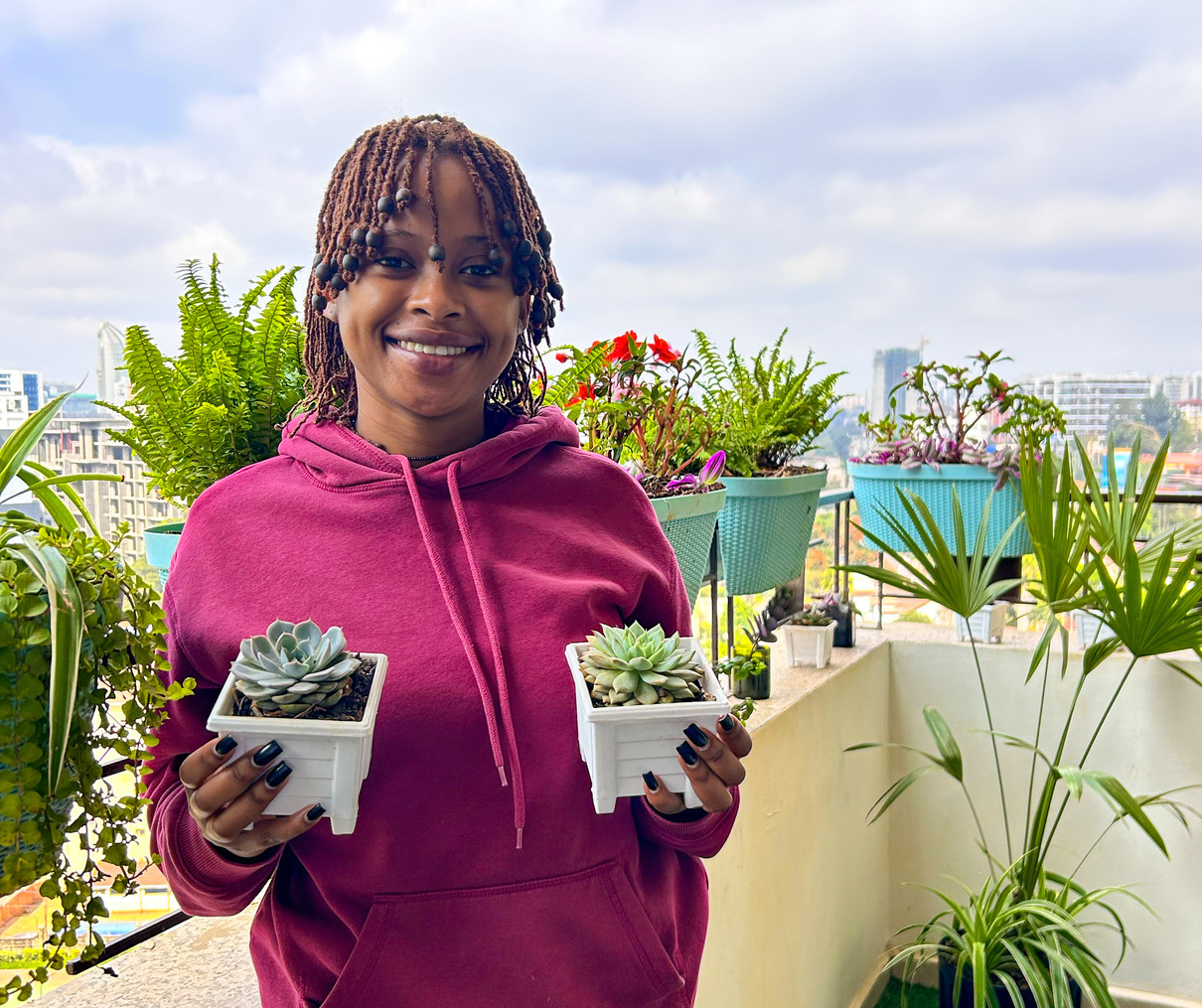
Whitney Louis, plants, Kileleshwa, Nairobi, gardening

Instead, she was burdened with a heavy sense of unease. Evenings in her new place were difficult as the emotional toll of being alone sank in.
Her new flat did not feel homely. She had no one to talk to at meal times. Without the comfort of everyday conversation, the feeling of movement that comes from sharing a space, and the lively bustle of a family household, loneliness took root.
“I moved out in 2022. The quiet hit me harder than expected. Apartment living can feel cold, physically and emotionally. Concrete walls and quiet evenings can become overwhelming,” she said.
Some African youth have mental health concerns that go unaddressed.
A November 2024 meta-analysis in ‘Cambridge Prisms: Global Mental Health’, pooled data from 63 studies across 14 Sub-Saharan African countries (55,071 young people) and found that 15.27 per cent experienced depression, 11.78 per cent anxiety and 12.53 per cent PTSD, a clear reflection of the emotional challenges facing African youth.
At first, Louis, a commercial pilot, content creator and Airbnb host, attempted to fill the silence with work. She filled her days with flying scheduled regional flights, which required early starts and long hours. She also created lifestyle and travel content for her expanding online audience, and managed the day-to-day demands of her Airbnb guests. It was a difficult balancing act to maintain.
On paper, her life appeared fulfilling. She was productive, self-sufficient and always engaged. The discipline of work kept her going, but it didn’t fill the emotional emptiness that may accompany living alone for the first time.
“The days would blur together,” she said. “Sometimes I wouldn’t even remember to open the curtains.”
NEW PASSION
Her mother linked her to Joel Rintari, a Nairobi-based plant enthusiast, whose workshop was adorned with terrariums and rows of beautifully arranged succulents.
Rintari spoke vivaciously about the wonders of caring for plants. He gave her a starter set of six succulents, a modest gesture that, she said, changed everything.
Louis looked after the succulents with commitment, checking on them every day and learning their needs via observation.
She acquired more plants. Today, she has more than 100 indoor and outdoor plants in her home.
Her plant collection includes succulents, impatiens, monsteras, snake plants, palms, begonias and money plants.
Each plant, she claimed, has its own “rhythm and personality”. Her goal is to cover her entire living space with plants.
“I water them every three days, prune, check for pests, and move them around, depending on the light,” she said. “It’s not demanding. It’s peaceful.”
While regional research on plant care is scarce, general trends indicate a growing embrace of green or “plant therapy” spaces as emotional support in parts of southern Africa.
Barriers to accessing or seeking formal, mainstream psychological support services include stigma, cost and a lack of awareness of available services.
However, plant therapy offers an affordable, stigma-less approach to mental care and well-being.
According to a Texas A&M University survey from 2025, more than 70 per cent of houseplant owners said that their plants improved their mood and reduced anxiety, while 75 per cent reported lower stress levels in their workstation after adding greenery.
For Louis, the plants filled an emotional space rather than an aesthetic one. They became her companions, something to wake up to and look after. She often found herself wondering if they needed more light or water, and that sense of duty motivated her to get out of bed on bad days.
Her care regimen evolved into a grounding ritual, particularly during her emotional lows. It taught her to check in with herself and stay present.
Her plant collection attracts the attention of visitors. Many refer to her home as a “mini jungle”. The reactions are frequently a combination of adoration and curiosity, with some friends later adopting the habits themselves.
Fatuma Mare, a 27-year-old logistics and technology professional, has a similar connection to her plants. She keeps seven in total, each providing life and colour to her apartment. For her, returning home to healthy, growing greenery after a long day is a gift.
“It’s like a tap on my back,” she said. “At least I know I’m doing something right.”
Her relationship with her plants is rooted in reciprocity.
“It’s me taking care of my plants and, in return, taking care of me,” she said.
She defines her home as a micro-ecosystem in which beauty and nature coexist. Mare grew up surrounded by plants and began caring for her collection in 2017, when she moved into her place. Her daily maintenance is a calming ritual that settles her and brightens her surroundings with greenery.
Louis’s favourite plant is a jade bonsai that she has cared for over time. It started small. “Watching it grow has been a reflection of my personal development.”
Another plant that bears significance for her is an elephant ear plant that had once lost all its leaves.
“It completely died. But I didn’t give up on it. I kept watering it and eventually, it came back. That resilience spoke to me.”
Despite her busy schedule as a commercial pilot, Louis has discovered ways to keep her plant routine stress-free. When she’s flying, trusted individuals at home step in to help, but it never feels like she’s transferring responsibility. It is something her friends and family always look forward to.
Sharing her journey on Instagram has allowed Louis to connect with other young plant enthusiasts. “It’s not just about the plants anymore. It’s about the people I’ve met through them,” she says. “They now gift me plants for birthdays and big milestones. It has become a part of my identity.”












